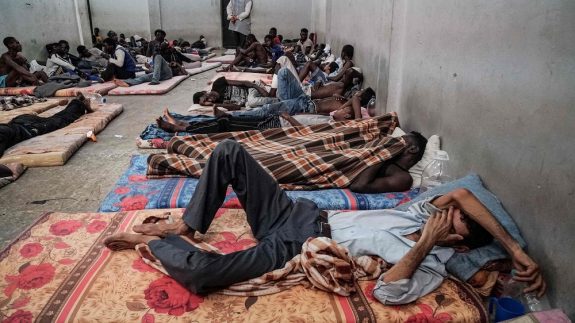The Retainer Solution: The European Union, Libya and Irregular Migration

There is a venom in international refugee policy that refuses to go away: officials charged with their tasks, passing on their labours to those who might see the UN Refugee Convention as empty wording, rather than strict injunction carved upon stone. They have all become manifest in the policy of deferral: humanitarian problems are for others to solve. We will simply supply monetary assistance, the machinery, the means; the recipients, like time honoured servants, will do the rest.
The European Union, and some of its members, have their own idea of a glorified servant minding their business in North Africa. The EU Emergency Trust Fund for Africa is the pot of gold; the recipient is Libya, an important “transit country for migrants heading to Europe.” Such a status makes Libya the main point of outsourced obligations associated with human traffic. Using Libya supposedly achieves the objectives of the Joint Communication ‘Managing flows, saving lives’ (never pass up the chance to use weasel words) and the Malta Declaration.
In responding to the regional refugee crisis, the EU mires itself in the wording of bureaucracy, machine language meant to be inoffensive. The first phase of the “Support to Integrated border and migration management in Libya” sounds like an allocation of mild tasks, a simple case of proper filing. In summary, it “aims to strengthen the capacity of relevant Libyan authorities in the areas of border and migration management, including border control and surveillance, addressing smuggling and trafficking of human beings, search and rescue at sea and in the desert.” A casual takeaway from this is that the EU is not merely being responsible but caring, assisting a country to, in turn assist migrants and refugees from making rash decisions, saving them when needed, and protecting them when required.
According to its unconvincing brief, “the EUTF for Africa pays particular attention to protection and assistance to migrants and their host communities in the country in order to increase their resilience.” In arid language, there is lip-service paid to “support a migrant management and asylum in Libya that is consistent with the main international standards and human rights.”
Such documents conceal the appallingly dire situation of Libya as the sponsored defender of Europe against irregular arrivals. Money sent is not necessarily money well spent. Detention centres have become concentrations of corrupted desperation, its residents exploited, tormented and kidnapped.
Accounts of torture in such camps have made their way to Human Rights Watch and Amnesty International. In July 2018, Human Rights Watch paid a visit to four detention centres in Tripoli, Misrata and Zuwara. The organisation found “inhumane conditions that included severe overcrowding, unsanitary conditions, poor quality food and water that has led to malnutrition, lack of adequate healthcare, and disturbing accounts of violence by guards, including beatings, whippings, and the use of electric shocks.”
The EUTF for Africa lacks human context; dull, bloodless policy accounts make little mention of cutthroat militias jousting for authority and the absence of coherent, stable governance. In May, the UN High Commissioner for Refugees spokesperson Charlie Yaxley claimed that the UNHCR was “in a race against time to urgently move refugees and migrants out of detention centres to safety, and we urge the international community to come forward with offers of evacuation.”
Such races have tended to be lost, and rather badly at that. The militias are on the move, and one war lord eager to make an impression is Khalifa Haftar. On July 3, some fifty people perished in an airstrike when two missiles hit a detention centre in Tripoli hosting 610 individuals. The finger pointing, even as the centre continued to burn, was quick, with blame duly allocated: Italy’s interior minister Matteo Salvini, and Libya’s UN-recognised and misnamed Government of National Accord (GNA) saw the hand of Haftar’s Libyan National Army. The intended target, according to LNP general Khaled el-Mahjoub, had been the militia camp located in the Tajoura neighbourhood.
Salvini, for good measure, also saw another culprit in the undergrowth of responsibility. While the rest of the EU could not shy away from this “criminal attack”, France would prove an exception, given their “economic and commercial reasons” for supporting “an attack on civilian targets.” Salvini is right, up to a point: France has an interest in supporting Haftar, given its interest in the eastern Libyan oilfields which he controls. The EU continues to speak in harshly different voices, none of them particularly humanitarian.
The UN special envoy for Libya, Ghassan Salamé suggested that the strike “clearly could constitute a war crime” having killed people “whose dire conditions forced them to be in that shelter.” The envoy’s formulation was striking: it was not the fault of GNA authorities who had detained migrants near a military depot; nor did the EU harbour any responsibility for having ensured the conditions of “managed” traffic flow that had led to the creation of detention centres.
The debate that followed was all a matter of logistical semantics; the camps proved to be, yet again, areas of mortal danger and hardly up to the modest standards of the EU’s refugee policy. To add to the prospects of future butchery, 95 more people have been added to the Tajoura centre. The cruel business has resumed.
Like what we do at The AIMN?
You’ll like it even more knowing that your donation will help us to keep up the good fight.
Chuck in a few bucks and see just how far it goes!
Your contribution to help with the running costs of this site will be gratefully accepted.
You can donate through PayPal or credit card via the button below, or donate via bank transfer: BSB: 062500; A/c no: 10495969










1 comment
Login here Register here-
wam
Return to home pageWhat a tangled web we have released since the mongrel lie of WoMD.